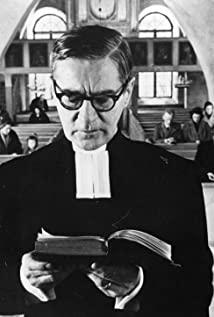I have always liked Bergman's films. Because in Bergman's film, you can find both the poetic dreamlike and the light of reason hidden under the narrative. From this point of view, the movie "Still in the Mirror" is still a typical Bergman-style film.
"Still in the Mirror" is the first part of the trilogy of the Silence of God filmed by Swedish director Ingmar Bergman. In the third year thereafter, the director has filmed two other parts-"Winter Day". "Light" and "Silence". Fans who are slightly familiar with the director of the film know that themes related to faith have always existed in Bergman's films. If he was full of doubts about faith in his early films, then he completely denied the existence of God in his later films. This film is the key work that witnessed this transformation of the director.
"Still in the Mirror" tells the story of Karin, who inherited her mother's mental illness, and after some treatment, went to an island with her father to recuperate. His husband Martin and his younger brother Minas also came to the island to rest. But as time went by little by little, the anxiety in their respective hearts gradually became apparent.
This film, filmed in 1961, is different from the film in the general sense. The plot is limited to the limited space and time of the scene, the relationship between the characters is simple, and the structure of the story is very simple. This is the formation period of Bergman's "psychological indoor drama", these films usually show the dilemma of character communication and psychological shadows.
From the beginning of the film, the emotional tone of the film was established through the color of the picture and the soundtrack. The low-pitched cello blends into the black and white images and the slow rhythm of the story, making it sad. The film’s traditional frame ratio also shows a dull and depressing atmosphere. Under such circumstances, the audience quickly entered the depressed inner world of the characters in the film.
Although in Bergman's films, the discussion of beliefs is always tireless, but when you really enter them, the gains from them far exceed the enlightenment that beliefs bring us. He always wraps up the multiple and far-reaching images in the movie with a seemingly simple story. This is probably the mystery that most of Bergman's movies can exist beyond the limitations of the times.
Regardless of the form of the film, "Still in the Mirror" also presents a rich sense of hierarchy in ideology. From my personal point of view, this film mainly discusses in depth from the following three themes.
1. The God that the world believes in does not exist.
Although the heroine of the film Karin has been troubled by mental illness, she follows her own beliefs in her heart. However, when she was tortured in the dark, she wanted to plunge into the arms of God, and tried to communicate and dialogue with God, but her hopes fell through time and time again. Even when she felt hopeless and helpless, she looked forward to God's salvation with a pious heart, God turned into a big spider, and she was on the verge of collapse again.
Karin's experience has almost become evidence of Bergman's denial of God. One desperate scene after another seems to tell people: The God that the world believes in does not exist, and everyone is isolated and helpless.
2. Everyone lives in their own cage.
Almost everyone in the film is in a difficult situation to escape. Karin was tortured by mental illness, and most of the time he couldn't get the understanding of his loved ones. In addition to work, Martin took great pains with Karin's illness. He saw that his lover was sick, but he was helpless; Karin’s father fell into despair from time to time because of the emptiness in his life, and even tried to commit suicide during a business trip; and the 17-year-old Minas was in adolescence full of confusion and confusion. The depressed heart can neither be released nor listened to.
3. There is also an insurmountable spiritual barrier between the loved ones.
The hostess Karin accidentally read her father's diary, only to find that her father used his illness to accumulate material for his novel creation. This kind of estrangement and estrangement in family affection subsequently led to another collapse of her body and mind in a more indirect manner.
Not only the father, but since Karin fell ill, there has also been an invisible estrangement between Karin and her husband Martin. During this period, no matter how much Martin showed love to Karin, she was still unable to restore the intimacy and trust of the past with her husband. And she insisted that only her younger brother Minas was the one who really understood her.
Father David ignored family life for his writing career, and his heart was already occupied by some inexplicable pain and contradiction. Even so, David still pretends to be busy and fulfilling in front of his children, and Karin and Minas have never reached a true understanding with their father.
Sensitive Minas longed for his father's love and hoped to have more spiritual communication with his father. However, his father was always immersed in the creative world, so that he had sought comfort from his sister Karin several times.
It can be seen that the characters in the film are all suffering from the pain and torture of the world. In this way, the film's argument is inevitably showing a bit of pessimism.
However, it has to be said that the movie "Still in the Mirror" to a large extent reveals the most real situation in life. Perhaps this is the reason why the film is depressing and dull but still fascinating. At the same time, it also gives people who have the same predicament as the characters in the film a deep spiritual comfort.
The dim and bleak sky, the cold and wet shipwreck, the isolated island, the cry in the wilderness, the window that always sinks in the dark, etc. Looking back at the movie’s images, every frame is like a dream, but This seems more like a broken dream. And everyone in the dream is trapped on an island, lost in despair, unable to escape...
View more about Through a Glass Darkly reviews











